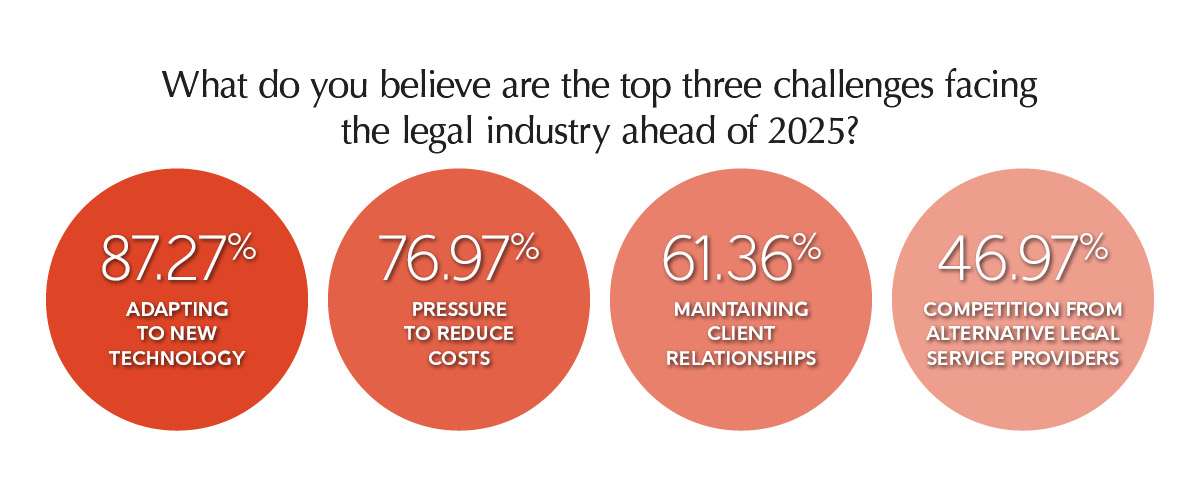The legal profession is undergoing notable shifts, prompting an in-depth look at how these changes are shaping the industry's future. To gain a clearer understanding of how lawyers perceive the future, Best Lawyers® surveyed honorees across the United States, with over 650 responding. Their insights reveal both challenges and opportunities, offering a roadmap for firms to navigate the future of the legal industry.
- The legal landscape is shifting fast. A nationwide survey of 650-plus attorneys shows what firm leaders must address now.
- Technology tops priorities, with 87% citing AI and automation as critical for efficiency, cost control and client service.
- Clients expect faster work and lower fees. Two-thirds want speed, nearly half want alternative billing.
- Culture matters. Flexibility, work-life balance and talent retention will shape competitiveness through 2025 and beyond.
Survey Purpose and Scope
Best Lawyers’ 2025 Legal Outlook Survey aimed to explore what lawyers envision for the future of their profession, uncovering valuable perspectives into their expectations and priorities.
Respondents represented a broad spectrum of firms, with the majority coming from larger firms with over 200 attorneys (26.60%) and small firms with 2-10 attorneys (23.86%). Mid-sized firms (11-50 attorneys) accounted for 23.40%, followed by firms with 51-200 attorneys (17.02%), while solo practitioners made up 9.12%.
While the report did not categorize responses by practice area, it reflects the input of a diverse group of attorneys, offering a broad view of perspectives on the industry's future.
These findings offer a forward-looking assessment, helping firms understand what it takes to remain competitive and navigate a rapidly evolving profession.
Key Challenges Facing the Legal Industry in 2025
The survey revealed several factors that legal professionals believe will shake up the industry in the coming years. Among these, four stand out prominently:
1. Adapting to New Technology
An overwhelming 87.27% of respondents identified adapting to new technology as the top priority for the industry's future. From artificial intelligence (AI) to automation, technological advancements are reshaping every aspect of legal practice, from case management to client communication.
Firms must continuously invest in emerging technologies to remain competitive, yet integrating these tools often requires overcoming steep learning curves and high initial costs.
2. Reducing Costs
Approximately 76.97% of lawyers noted the pressure to reduce costs as a crucial element in strategic planning. Clients are increasingly demanding high-quality services at lower fees, forcing firms to find ways to maintain profitability while meeting these expectations.
For smaller firms, cost pressures represent a critical concern, as they often lack the resources to invest in technology or expand their offerings to compete with larger firms.
3. Maintaining Client Relationships
Ranked as a key area of focus by 61.36% of respondents, maintaining strong client relationships requires firms to deliver personalized, efficient and transparent services. In a competitive market, these relationships are critical to client retention and growth. As firms expand their use of technology, ensuring that client interactions remain personal is an additional opportunity.
4. Competing with Alternative Legal Service Providers
Competition from alternative legal service providers (46.97%) also emerged as a significant aspect to address for traditional firms. These providers include companies that handle specific legal tasks, such as document review, e-discovery, or contract management, often using advanced technology to deliver efficient and cost-effective solutions. Their growth pushes traditional law firms to innovate and find new ways to stand out.

Changing Client Expectations
As the legal industry evolves, so do the expectations of its clients. Survey respondents highlighted the following key trends:
Clients’ expectations are mutating rapidly, with 66.67% of respondents citing the demand for faster and more efficient service as a primary concern. Additionally, 49.54% highlighted the expectation of lower fees and alternative billing models. These demands reflect a broader change in client behavior, driven in part by the accessibility of information and legal resources online.
Technology has amplified these demands, with clients seeking real-time communication, administrative simplicity and favorable outcomes. Firms must balance these expectations with the need to maintain profitability, creating a balanced approach that requires adaptability.
Many firms are turning to data analytics and client feedback systems to better understand and meet these expectations. By leveraging these tools, firms can offer tailored solutions that improve client satisfaction.
Factors Influencing Law Firm Success
Several factors emerged from the survey as critical to the success of law firms in the coming year. These include:
Economic Conditions
Approximately 30.45% of respondents identified economic conditions as a significant factor impacting law firm success. As companies navigate budget constraints and post-pandemic recovery, firms must remain agile and resourceful. Understanding regional and global economic trends can help firms anticipate client needs and adjust their strategies accordingly.
Talent Acquisition and Retention
Closely tied with economic conditions, talent acquisition and retention were cited by 30.30% of respondents. Offering competitive compensation, fostering a supportive culture and embracing flexibility are essential to retaining top talent.
Firms that fail to adapt to these demands risk losing key contributors to competitors or in-house positions that offer better work-life balance.
Client Relationship Management
Strong client relationships remain a cornerstone of success. Firms that prioritize communication, transparency and trust will be better positioned to thrive in a competitive market. Personalized service and consistent follow-up are increasingly vital as clients seek firms that truly understand their unique needs.
Political and Regulatory Environment
The incoming administration is expected to reorganize the political and regulatory framework, focusing on reducing barriers and prioritizing deregulation. Honorees also expressed concerns about how policies on immigration, the judicial system and democratic principles may impact the legal profession.
Legal Industry Predictions for the Coming Years
Looking ahead, lawyers shared their perspectives on how the profession is likely to change over the next three to five years. The following themes dominated their predictions:
When reflecting on the future, lawyers overwhelmingly pointed once again to technological advancements as the most significant driver of change, with 83.56% emphasizing the impact of AI and automation.
These technologies are expected to improve efficiency in areas such as document review, legal research and e-discovery. For example, AI-powered tools can significantly reduce the time required for contract analysis, freeing attorneys to focus on higher-value tasks.
Changing client expectations (30.14%) and the rise of non-traditional legal service providers (59.85%) are also shaping the industry. The survey revealed an increasing trend toward firm consolidation, alternative dispute resolution and a decline in associates aspiring to partnership roles.
Younger generations are also prioritizing work-life balance, signaling a cultural shift within the profession. As a result, we might see new business models, including hybrid firms that blend traditional and innovative approaches to service delivery.
Adapting Law Firm Culture
To attract and retain top talent, law firms must adapt their cultures to align with modern values.
Increased flexibility and remote work options were highlighted by 60.18% of respondents, while 57.90% emphasized the importance of work-life balance. Firms that support these priorities, through equitable compensation practices, mentorship programs and inclusive policies, will be better positioned to build a strong and capable workforce.
Workplace culture is also transforming to address the unique needs of diverse attorneys. From offering parental leave to creating affinity groups, firms are taking steps to foster inclusivity and support employees at every stage of their careers. This cultural evolution not only improves employee satisfaction but also strengthens the firm’s reputation as a desirable place to work.
The Role of Technology
“What roles do you think artificial intelligence (AI) will play in the legal industry in the coming years?” When asked this question, respondents highlighted a range of perspectives on how AI is transforming legal work.
Automating routine tasks (76.52%) and improving legal research capabilities (74.85%) were identified as key benefits. However, concerns about misinformation, job displacement and ethical implications persist.
Addressing these concerns requires thoughtful implementation and ongoing training to ensure that technology complements, rather than replaces, human expertise.
Firms must navigate these complexities carefully, leveraging technology to improve efficiency while maintaining high standards of quality and ethics. For instance, blockchain technology is emerging as a potential tool in areas such as smart contracts and secure data management, offering firms new ways to improve transparency and security.
What Lies Ahead: Legal Service Demand and Key Priorities
While 44.61% of respondents believe the demand for legal services will increase slightly, 36.57% anticipate stability. This cautious optimism reflects confidence in the industry’s resilience, coupled with pragmatism about potential economic and market factors.
To capitalize on this outlook, firms should focus on proactive client engagement and continuous improvement in service delivery.
Lawyers were also asked to identify the top priorities they believe law firms should focus on to remain competitive. Their responses highlighted improving client service (64.59%), adopting technology (63.37%) and enhancing operational efficiency (44.07%). These recommendations emphasize the importance of prioritizing innovation, streamlining operations and adopting client-focused strategies to ensure long-term success.
Preparing for the Future of Law
Best Lawyers’ 2025 Legal Outlook survey highlights both opportunities and challenges facing the legal industry. As firms navigate advancements in technology, evolving client demands and cultural changes, adaptability and proactive planning will be key. By acting on these insights, firms can foster client trust, build stronger teams and secure their place in the future of law. Explore the Best Lawyers legal directory to see recognized peers and discover insights from across the legal profession.








































